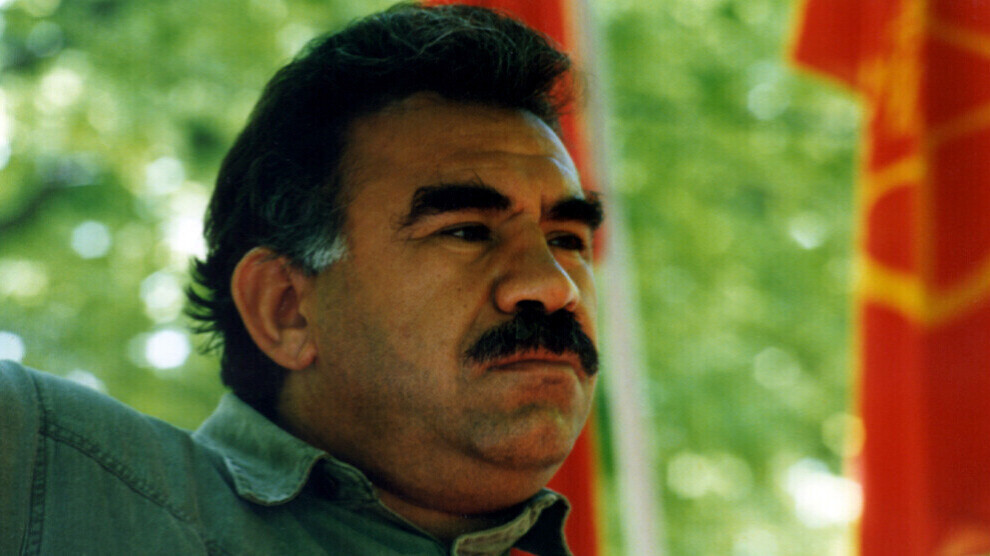Families submit another application to visit Imrali
The family and legal guardian of Kurdish leader Abdullah Öcalan renewed the application to Turkish authorities to pay a visit to İmralı prison where Öcalan is held under aggravated isolation.
The family and legal guardian of Kurdish leader Abdullah Öcalan renewed the application to Turkish authorities to pay a visit to İmralı prison where Öcalan is held under aggravated isolation.

Families of the Kurdish political prisoners in Imrali Island Prison, Abdullah Öcalan, Ömer Hayri Konar, Hamili Yıldırım and Veysi Aktaş have once again applied to the Bursa Chief Public Prosecutor's Office and the management of Imrali Island Prison to meet with their relatives.
Abdullah Öcalan's brother Mehmet Öcalan and his legal guardian Mazlum Dinç and Ömer Hayri Konar's brother Ali Konar, Hamili Yıldırım's brother Polat Yıldırım and Veysi Aktaş's sister Melihe Çetin lodged an application to the Public Prosecutor of Bursa and Imrali Prison Administration for meeting the inmates next Monday (Jan. 17).
Öcalan has been kept under aggravated isolation in Imrali High Security F-Type Prison near Istanbul since he was captured following an international conspiracy in 1999.
On March 14, rumours spread on social media claiming that Öcalan had died in prison. Immediately, protests were organised around the world demanding an urgent visit by the lawyers to Imrali.
On March 25, Öcalan was able to talk with his brother Mehmet Öcalan. The short phone conversation happened about a year after a previous call, on 27 April 2020, and it is the first time since then that Öcalan had actual contact with someone outside.
The phone conversation was held under the supervision of the Urfa Chief Public Prosecutor's Office and was very short. The call was interrupted pretty soon. Likewise, the phone call by another prisoner on Imrali, Hamili Yıldırım, with his family was also abruptly interrupted. It was reported that the other two prisoners, Ömer Hayri Konar and Veysi Aktaş, did not make the phone call they were offered to protest isolation.
All applications for visit have been so far rejected or gone unanswered.
Lawyers of Öcalan were able to meet their client on May 2-22, June 12-18 and August 7, 2019, first time in 8 years. Since August 7, 2019, all applications have gone unanswered.
After Öcalan’s lawyers applied to a Bursa court for an “urgent meeting” on November 22, it came out that two further bans had been issued against the Kurdish leader. The Bursa court rejected the application, citing a 6-month visitation dated October 12 as a reason.
The court also rejected the application of the families for a meeting with their relatives, citing a 3-month family visitation ban issued by the Disciplinary Board of the Imrali Penal Institution dated August 18, 2021.
The Imrali Delegation, which was able to hold talks with Öcalan within the framework of peace negotiations, has not been allowed to visit the prison island since April 2015. Since the last visit of the team of lawyers on August 7, 2019, the Turkish authorities have not responded to any of the continuous requests for visits.
The Turkish authorities use the "roadmap for negotiations" submitted to the European Court of Human Rights in 2009 as the justification for the ban on visits by Abdullah Öcalan's team of lawyers.
On the other hand, the investigation launched in 2012 against lawyers of Kurdish people's leader Abdullah Öcalan, Rezan Sarıca, Ali Maden, Baran Doğan, Cengiz Yürekli, İnan Akmeşe, Mahmut Taşçı and Mehmet Selim Okçuoğlu, was picked up again at the beginning of 2021.
The lawyers went to the prosecutor's office and gave a statement. After the statements were taken, the indictment prepared by the prosecutor's office was accepted by the Istanbul 33rd High Criminal Court. Lawyers are accused, among other things, of "membership of a terrorist organization", and they are expected to appear in court in September.
In the indictment, where lawyer meetings with Öcalan were shown as a criminal element, the lawyers' refusal to accept the accusations against them was also cited as a criminal element. In addition, while lawyer Cengiz Yürekli's use of his right to remain silent was shown as an element of crime, phone calls made by detainees with their families due to their profession were also considered a crime.
The most interesting subject of accusation in the indictment was that statements such as "isolation is being applied to Öcalan" and "lawyers have not been allowed to see him for 300 days" were cited as criminal elements. These were sentences contained in statements made by the lawyers to the press.